Crisis 1: COVID-19
The threat of COVID-19 is one of many challenges that Haitians are facing. As opposed to other countries, Haiti’s streets and marketplaces are still over-crowded, as if COVID-19 doesn’t exist.
The marketplace is an integral part of daily life. People buy and sell food at the outdoor markets almost every day as they don’t have fridges and being a vendor is a livelihood for many. Infrastructure is so bad that any accessible street is always packed with tons of people, trying to catch a taptap or sell their goods.
People use a mask where it is mandatory (schools, banks, etc.), but many people can’t afford one as they don’t have any spare change to even feed their children. In spite of the ignorance, the number of COVID-19 victims in Haiti is relatively low.
Why is the COVID-19 prevalence so low in such an unsafe environment?
• The average life span in Haiti is 62 years. COVID-19 is more dangerous to people older than that;
• COVID-19 is a threat to people with underlying health issues. In Haiti, the population with underlying health issues is small;
• With other infectious diseases still rampant in Haiti, such as TB and Typhoid, COVID-19 might not necessarily be on the people’s radar;
• In general, Haitian people look for natural medicine rather than conventional medicine. In those cases COVID-19 is not officially registered;
• Tests are not widely available so people with COVID-19 might go undiagnosed;
• There’s a stigma on COVID-19 patients. Houses, a medical lab and a hospital were burned down because of COVID-19. People are scared to share that they have COVID-19, for fear of losing their home.
• Haiti has a broken health system. There is no health insurance. Poor people don’t have access to free health care and private clinics are too expensive. There is not enough medical staff to serve the entire population, so even if one has COVID-19, it might never get noticed by medical staff.
As of 2/23/2021, there were 12,309 confirmed COVID-19 cases and 247 confirmed COVID-19 deaths.
How does KCH cope in the COVID-19 context?
Our tailor students sewed face masks and provided them to all students (and other communities);
We provided all students with a COVID-19 emergency kit, including soap, sanitizer, Clorox, and food items;
We educate our students during each workshop to reiterate the importance of wearing masks;
Masks are mandatory during all of our workshops and staff/student meetings;
Two KCH nurses assessed the health of all students. They follow up regularly with the students who need special medical attention.
